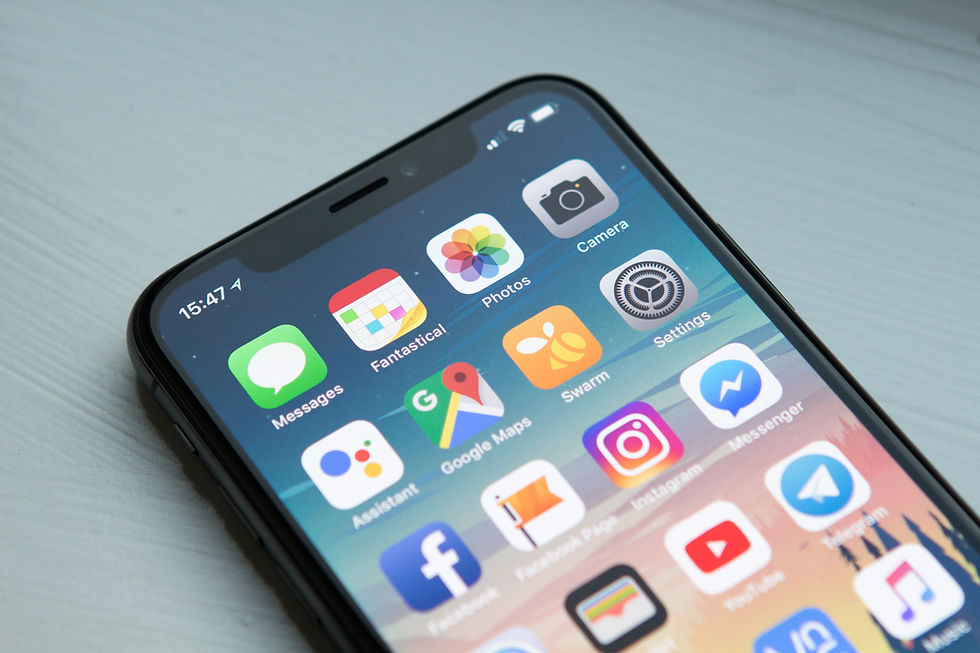AI & Marketing Automation: What Marketers Need to Know
- Pravaah Consulting

- Jun 29, 2023
- 7 min read
In a world where marketing is constantly evolving, staying ahead of the curve is essential for marketers seeking to drive success in the digital landscape. Enter Artificial Intelligence (AI), the innovative powerhouse revolutionizing marketing automation. With AI for marketing automation at their disposal, marketers can harness its transformative capabilities to streamline processes, enhance customer experiences, and achieve remarkable results.
AI-powered tools and algorithms are the driving force behind marketing automation AI. They empower marketers to analyze vast customer data, uncover hidden insights, and create highly targeted and personalized campaigns. The synergy between AI and marketing automation enables marketers to optimize their strategies and deliver messages that resonate with their audience on a whole new level.
Gone are the days of tedious manual tasks. The advent of AI marketing automation allows marketers to automate routine activities like lead scoring and email marketing, freeing up valuable time and resources. This newfound efficiency empowers marketers to focus on strategic initiatives that drive growth and foster creativity.
In this blog post, we will delve into the various aspects of AI and machine learning in marketing automation and shed light on what marketers need to know about this powerful combination. We will explore the applications of AI and machine learning in marketing automation, their benefits, and the challenges and considerations that come with the implementation.
So, let's dive into the world of AI and marketing automation along with machine learning and discover how these powerful forces are shaping the future of marketing.
Understanding AI for Marketing Automation

Artificial Intelligence (AI) is the simulation of human intelligence in machines programmed to think and learn like humans. AI utilizes algorithms and data analysis to process information, make predictions, and adapt based on experience. Its goal is to automate tasks, optimize processes, and drive innovation across industries.
Marketing automation, on the other hand, involves using technology and software to automate repetitive marketing tasks and processes. When AI and marketing automation converges, they create a dynamic duo that can drive efficiency, personalization, and effectiveness in marketing efforts.
AI-driven marketing automation systems leverage machine learning algorithms to gather, analyze, and interpret vast amounts of data. These algorithms can automatically identify patterns, predict outcomes, and make data-driven decisions. By automating tasks such as lead scoring, email marketing, and customer segmentation, marketers can focus their time and efforts on their campaigns' strategic initiatives and creative aspects.
Let us now delve into the diverse applications of AI in marketing.
Applications of AI in Marketing
1. Data Insights
Artificial intelligence (AI) is a powerful tool for providing data insights in marketing automation, even without the need for data engineers. By employing artificial intelligence marketing automation techniques, AI models can effectively analyze customer data, enabling the identification of patterns and the automatic grouping of customers based on those patterns. This capability empowers marketers to gain valuable insights into customer behavior and preferences, enhancing their decision-making process.
2. Personalization
One of the critical applications of AI for marketing automation is personalization. AI models, through AI marketing automation techniques, excel at the real-time identification of customer preferences and the ability to personalize content accordingly. Leveraging AI for marketing automation enables personalized experiences through techniques such as product recommendations, dynamic websites, self-optimizing campaigns, and customized messaging via chatbots. This level of personalization enhances customer engagement and satisfaction.
3. Campaign Recommendations
Artificial intelligence marketing automation plays a crucial role in providing campaign recommendations to marketers. AI can recommend content, including tone of voice, review content, and image selection, helping marketers optimize their campaigns. AI algorithms can also identify specific customer segments that respond better to certain campaigns, pinpoint inefficient campaigns, and highlight those significantly impacting customer lifetime value. Leveraging AI for marketing automation empowers marketers to refine their movements and achieve better results.
4. Scheduling
Scheduling is a vital aspect of marketing automation, and AI for marketing automation plays a significant role. By utilizing marketing automation AI capabilities, AI algorithms analyze individual customer preferences, open rates, and click patterns to determine the optimal time to deliver communications. It ensures that messages reach customers at the most opportune moments, increasing the effectiveness of marketing campaigns.
5. Programmatic Advertising
AI for marketing automation is highly beneficial for marketers engaged in programmatic advertising. By leveraging AI marketing automation techniques, AI models can analyze real-time data to predict campaign outcomes for different target audiences. Additionally, AI algorithms can optimize bidding strategies to maximize return on investment (ROI) and match content with the most relevant audiences, enhancing the efficiency and relevancy of programmatic advertising efforts.
6. Next-Best-Action Decisioning
AI-driven marketing automation brings a new level of sophistication to next-best-action decisions. By leveraging AI for marketing automation, marketers can utilize artificial intelligence marketing automation techniques to determine the most suitable campaign for each customer. It goes beyond predefined automation, as AI algorithms consider customer preferences and behavior to deliver the most relevant campaign. Leveraging AI for marketing automation enables marketers to provide personalized and engaging customer experiences.
In the next section, let us explore the benefits of AI in Marketing Automation.
Benefits of AI in Marketing Automation
1. Enhanced Customer Insights
One of the significant advantages of AI-driven marketing automation is its ability to collect and analyze vast amounts of customer data. With AI algorithms, marketers can gain deep insights into customer behavior, preferences, and purchase patterns. This data can be used to create highly targeted and personalized marketing campaigns, resulting in increased customer engagement and conversions.
2. Improved Lead Scoring and Nurturing
AI-powered marketing automation platforms leverage AI for marketing automation to analyze customer data and identify high-quality leads. These platforms can analyze historical data and detect patterns that indicate the characteristics of a qualified lead by using machine learning algorithms. By automating the lead scoring process, marketers can prioritize their efforts on prospects with a higher likelihood of conversion. This enables them to tailor their nurturing strategies and allocate resources effectively, maximizing their chances of success. With AI for marketing automation, marketers can optimize their lead management process and focus on cultivating relationships with the most promising leads.
3. Personalized Customer Experiences
AI-driven marketing automation enables marketers to create personalized customer experiences at scale. By leveraging customer data, AI algorithms can deliver highly targeted content, product recommendations, and offers to individual customers. Personalization enhances customer satisfaction, improves engagement, and increases the chances of conversion. AI can also enable real-time personalization, where content and offers are dynamically adjusted based on customer behavior and preferences.
4. Streamlined Marketing Processes
Marketing automation AI can streamline various marketing processes and workflows. Tasks such as email marketing, social media scheduling, and campaign management can be automated, saving time and effort for marketers. AI algorithms can optimize marketing campaigns by automatically adjusting parameters such as ad spend, targeting, and content delivery based on real-time performance data.
As we know, machine learning is a subset of artificial intelligence. It plays a crucial role in AI-powered marketing automation. In the next section, let us explore machine learning and its applications in marketing automation.
Machine Learning in Marketing Automation
Machine learning plays a crucial role in marketing automation by enabling computers to analyze and learn from large volumes of data. With machine learning algorithms at the helm, AI-driven marketing automation systems can process and interpret complex data sets, uncovering valuable insights that drive marketing strategies. These algorithms can identify patterns, correlations, and trends within customer data, allowing marketers to make informed decisions based on data-driven predictions. Machine learning in marketing automation helps optimize tasks such as lead scoring, customer segmentation, and personalized content recommendations. By leveraging machine learning, marketers can automate processes, improve targeting, and deliver customized experiences that resonate with their audience, ultimately enhancing the effectiveness and efficiency of their marketing efforts.
In the next section, we will discuss the applications of machine learning in marketing automation and see how this powerful technology is revolutionizing marketing strategies.
Applications of Machine Learning in Marketing Automation
1. Predictive Analytics
AI for marketing automation utilizes machine learning algorithms to employ predictive analytics, enabling marketers to forecast customer behavior, identify churn risks, anticipate demand patterns, and optimize marketing campaigns. By leveraging AI for marketing automation, marketers can make data-driven decisions and allocate resources more effectively, driving better results and maximizing ROI(Return on Investment). The power of AI in marketing automation lies in its ability to analyze vast amounts of data and provide valuable insights for strategic decision-making.
2. Natural Language Processing (NLP)
Natural Language Processing (NLP) is a branch of AI that focuses on enabling computers to understand and process human language. Using NLP algorithms, customer interactions like social media posts, customer reviews, and support inquiries can be analyzed to extract valuable insights. Marketers can use these insights to gauge customer sentiment, identify emerging trends, and tailor their messaging accordingly.
3. Image and Video Recognition
AI-driven marketing automation can analyze visual content such as images and videos to extract meaningful information. Image and video recognition algorithms can identify objects, people, scenes, and emotions depicted in visual content. Marketers can leverage these insights to create compelling visual campaigns, target specific audiences, and optimize content for maximum impact.
Now, in the upcoming section, let us explore the ethical considerations and challenges related to AI and marketing automation.
Ethical Considerations and Challenges
AI and marketing automation, also known as AI marketing automation, offers immense potential but comes with ethical considerations and challenges. Responsible use of AI in marketing automation is crucial for ensuring the secure handling of customer data and maintaining transparency in data usage. Addressing biases in AI algorithms is essential to prevent discrimination. Job displacement is a concern as automation replaces routine tasks, but it also presents opportunities for upskilling and focusing on strategic activities that require human creativity. Marketers must prioritize responsible AI usage, establish robust data governance practices, and implement bias detection mechanisms. They should foster a culture of transparency, fairness, and accountability. By proactively managing the impact on jobs and embracing AI as a tool for augmentation rather than replacement, marketers can maximize the benefits while ensuring ethical practices. Striking a balance between AI and human involvement is crucial in effectively harnessing the power of AI and marketing automation, enhancing marketing strategies while maintaining ethical standards.
Key Takeaways
Artificial intelligence and marketing automation are reshaping the marketing landscape, offering marketers new opportunities to drive efficiency, personalization, and effectiveness. AI-driven marketing automation systems enable enhanced customer insights, improved lead scoring, personalized experiences, and streamlined processes. Machine learning algorithms, predictive analytics, NLP, and image/video recognition are key components that empower AI in marketing automation.
As marketers embrace AI and automation, navigating the ethical considerations and challenges associated with these technologies is essential. Responsible use of AI, transparency in data handling, and addressing biases are crucial for maintaining customer trust. By understanding and leveraging AI for marketing automation, marketers can unlock new levels of success in their campaigns and deliver exceptional customer experiences in the digital age.
Get in touch with us now to discover how Pravaah Consulting can help you coordinate your marketing campaigns and customer journeys.



